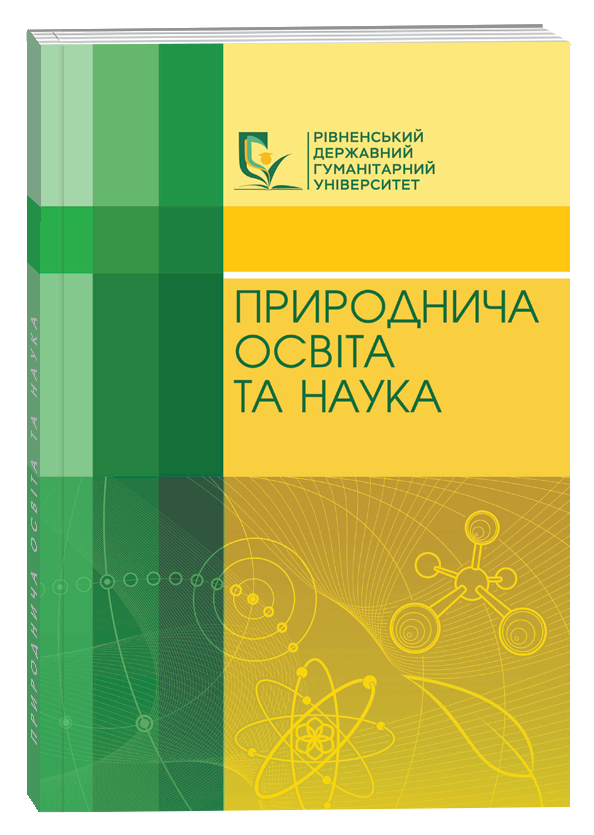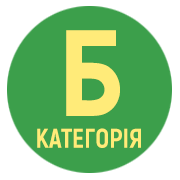ЕLECTIVE DISCIPLINES AS AN AUXILIARY TOOL FOR THE FORMATION OF PROFESSIONAL COMPETENCES AND OF AN ENVIRONMENTAL POINT OF VIEW
Abstract
Ukrainian educational institutions have introduced an individual educational path, which is recognised as a regulatory component and a variable part of the educational programme, namely elective disciplines. Each student has an individual curriculum where 25% of the total number of ECTS credits is made up of elective courses. Elective courses are offered by departments (at the University) and academic cycle commissions (at the College). Electives are taken from the second year onwards in numbers from 1 to 5 (within one semester) and are worth 3 credits. To form a cohort of students for the next year, the graduation department or the cycle commissions create a learning bank of elective subjects, which contains explanations or silabuses and is published on the website of the educational institution. In addition, the college organises a presentation of the electives. After analysing the answers of the students to the questionnaire on the factors for choosing the variable part of the curriculum, we concluded that the decisive factor is the self-referral to the explication and the silabus. The vast majority of students choose vocational subjects, thus demonstrating their interest in their future profession. There are two ways to environmentalise the educational process: to devote time to environmental issues in each course of a discipline, either as separate topics or by outlining the possible consequences of environmental impacts in each topic; and to offer environmentally relevant topics in the list of electives. Only a comprehensive approach can develop an ecological perspective. An effective tool is to involve students in conferences and round tables where they present their research and discuss them. Lectures by visiting professors and environmental campaigns are always of great interest to students. Student research clubs and scientific societies operate successfully in educational institutions. Students pay considerable attention to environmental issues through annual student conferences and scientific readings. The electives are an important part of the development of professional competences and environmental awareness.
References
2. Бабенко Т. В., Камінський О. М., Молодан В. С. Студоцентроване навчання як умова розвитку соціально-професійної мобільності майбутнього фахівця. Наукові записки. Серія: Педагогічні науки. 2022. № 206. С. 86–91. DOI: https://doi.org/10.36550/2415-7988-2022-1-206-86-91.
3. Бойченко М. А., Акалович М. В. Професійна підготовка майбутніх фахівців у галузі музичного мистецтва в Україні та Австрії: порівняльний аспект. Південноукраїнські мистецькі студії. Науковий журнал. 2023. № 2. С. 21–26. DOI: https://doi.org/10.24195/artstudies.2023-2.4.
4. Голубєва І. М., Васюкова М. М. Міждисциплінарна інтеграція – важливий напрямок у створенні навчальних програм дисциплін за вибором. Медична освіта, 2023. 3, 40–45. DOI: https://doi.org/10.11603/m.2414-5998.2023.3.14104.
5. Дунаєвська О. Ф., Луцак І. В., Умінська К. А., Зубрицька Л. О., Довженко Л. В., Зубрицька Т. Р., Шляніна А. В., Муленко С. М., Бур’янова В. В. Студентські наукові гуртки як активна складова формування фахових компетентностей здобувачів освіти. Перспективи та інновації науки (Серія «Педагогіка»). 2023. № 4 (22). С. 71–84. DOI: https://doi.org/10.52058/2786-4952-2023-4(22)-71-84.
6. Дунаєвська О. Ф., Луцак І. В., Умінська К. А., Шляніна А. В., Сокульський І. М. Студентське наукове товариство як складова формування наукового світогляду та реалізації науково-дослідного потенціалу здобувачів освіти. Вісник науки та освіти. 2023. № 2 (8). С. 383–396. DOI: https://doi.org/10.52058/2786-6165-2023-2(8)-383-396.
7. Іщенко Т. В. Освітні інновації у студентоцентрованому навчанні. Українські студії в європейському контексті. 2023. № 7. С. 229–232.
8. Корольчук Л. В. Екологізація освіти України на шляху до сталого розвитку. Сталий розвиток: захист навколишнього середовища. Енергоощадність. Збалансоване природокористування : колективна монографія / [авт. кол.: Мадані М. М., Крутоголова І. О., Андрєєва Н. М. та ін.] / за ред. проф. Мальованого М. С. Київ : Яроче́нко Я. В., 2022. 566 с. DOI: https://doi.org/10.51500/7826-23-0.
9. Лапшина О. О., Дорофєєва О. М. Зміст професійної підготовки фахівців з лінгвістики в університетах Великої Британії. Науковий вісник Ужгородського університету. Серія: «Педагогіка. Соціальна робота». 2021. Вип. 2 (49). С. 75–78. DOI: https://doi.org/10.24144/2524-0609.2021.49.75-78.
10. Ляшенко М. Ю. Вільний вибір навчальних дисциплін майбутніми педагогами професійного навчання на основі маркетингового підходу. Науковий часопис Національного педагогічного університету імені М. П. Драгоманова. Серія 05. Педагогічні науки: реалії та перспективи. 2020. Вип. 75, т. 1. С. 121–125. URL: http://enpuir.npu.edu.ua/handle/123456789/32419.
11. Плахтій Н., Пасічник О., Манзюк Е., Скрипник Т., Петровський С. Метод формування пулу вибіркових навчальних дисциплін на основі генетичного алгоритму. Вісник Хмельницького національного університету. Технічні науки. 2024. № 3, т. 1. С. 182–185. URL: https://elar.khmnu.edu.ua/handle/123456789/16691.
12. Про вищу освіту : Закон України від 1 липня 2014 р. № 1556-VІІ. Із змінами від 18.12.2019 № 392-ІХ. URL: http://zakon2.rada.gov.ua/laws/ show/ 1556-18/page.
13. Про освіту : Закон України від 5 вересня 2017 р. № 2145-VІІІ. URL: http://zakon2.rada.gov.ua/laws/ show/1556-18/page.
14. Про фахову передвищу освіту : Закон України від 6 червня 2019 р. № 2745-VІІІ. URL: https://zakon.rada.gov.ua/laws/show/2745-19.
15. Садова Т. Використання кейс-методу в професійній підготовці майбутніх педагогів. Педагогічні науки: теорія, історія, інноваційні технології. 2016. Вип. № 5 (59). С. 184–192.
16. Стецула Н. Екологізація освіти як ключова тенденція сталого розвитку суспільства. Молодь і ринок. 2020. № 6–7 (185–186). С. 115–121. DOI: https://doi.org/10.24919/2308-4634.2020.225780.
17. Шестак Я. Моделювання єдиного інформаційного простору закладу вищої освіти. Управління розвитком складних систем. 2022. № 49. С. 81–89. DOI: https://doi.org/10.32347/2412-9933.2022.49.81-89.






